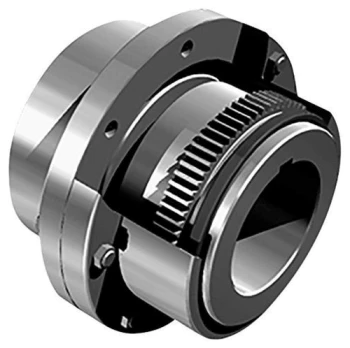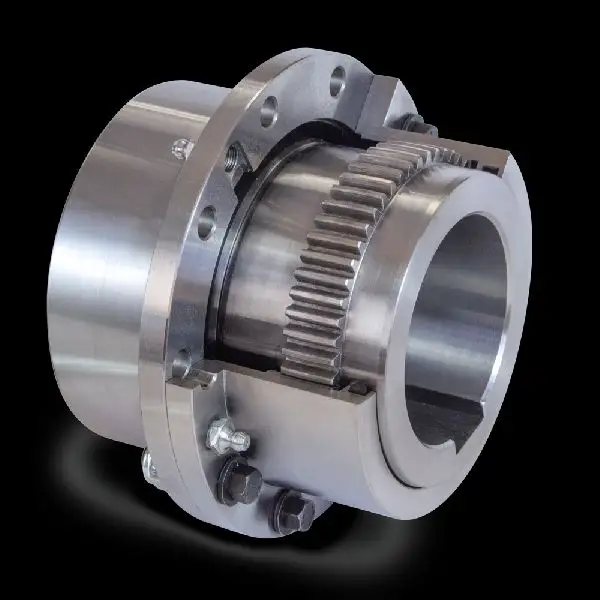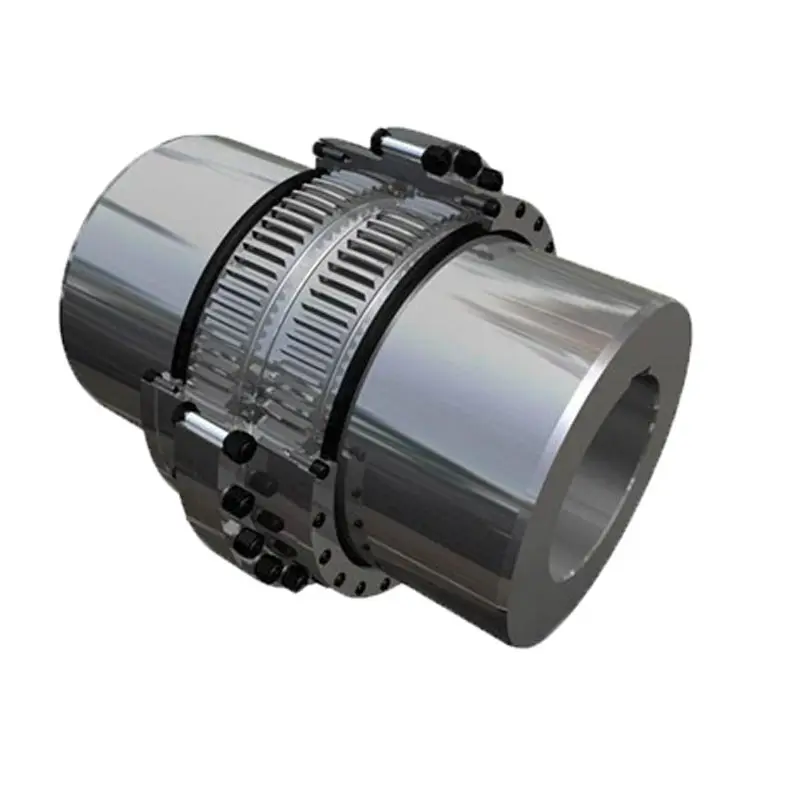Product Description
High Quality Steel Tooth Flexible Rubber Plastic Falk Flexible Nylon Sleeve Universal Joints Chainbox Muff Gear Coupling Replacement of Bowex Coupling
A gear coupling is a type of mechanical coupling that is used to connect 2 shafts at their ends to transmit torque and rotational motion. It consists of 2 hubs with external teeth connected by a flexible element, typically a sleeve or a disk, with internal teeth.
The hubs are usually made of steel or other high-strength materials, and the teeth are cut using precision machining techniques to ensure proper fit and alignment. The flexible element is designed to compensate for any misalignment between the 2 shafts and to allow for a slight amount of angular and axial misalignment during operation.
Gear couplings are commonly used in heavy-duty applications, such as in large machinery and industrial equipment, where high torque and precision are required. They are also used in applications where shafts are subjected to significant amounts of vibration and shock, such as in marine and aerospace applications.
One of the advantages of gear couplings is that they are highly efficient at transmitting torque, with very little energy loss. They are also durable and require minimal maintenance, making them popular in many industries.

Materials Used in Manufacturing Flexible Gear Couplings and Their Impact on Performance
Flexible gear couplings are designed to transmit torque while accommodating misalignments and reducing vibrations. The choice of materials for manufacturing these couplings plays a crucial role in their overall performance and suitability for specific applications. Some common materials used in flexible gear couplings include:
- Steel: Steel is a popular material for flexible gear couplings due to its high strength and durability. It can handle substantial torque loads and provides good resistance to wear and fatigue. Steel couplings are commonly used in heavy-duty applications, such as steel mills, mining, and power generation.
- Stainless Steel: Stainless steel is used when corrosion resistance is required, making it suitable for applications in corrosive environments like the marine, chemical, and petrochemical industries.
- Alloy Steel: Alloy steel is used to improve specific properties, such as hardness and heat resistance. It is often employed in high-temperature applications found in steel processing and power generation.
- Cast Iron: Cast iron is known for its excellent wear resistance and damping capabilities. It is used in applications where shock absorption and vibration reduction are critical, such as pumps and compressors.
- Aluminum: Aluminum is lightweight and offers good corrosion resistance, making it suitable for applications where weight reduction is important, such as aerospace and certain industrial machinery.
- Bronze: Bronze is used for its self-lubricating properties and resistance to wear. It is often found in couplings used in low-speed applications, such as conveyor systems.
- Nylon and Plastics: Nylon and other plastics are used in some couplings where electrical isolation and lightweight properties are essential, such as in medical equipment and certain automation systems.
The selection of materials depends on the specific requirements of the application, including torque, speed, temperature, environmental conditions, and the presence of corrosive substances. Proper material selection ensures that the flexible gear coupling can operate efficiently and reliably, providing optimal performance and minimizing maintenance needs.

Real-World Case Studies of Flexible Gear Couplings in Engineering Projects
Flexible gear couplings have been successfully implemented in various engineering projects across different industries. Here are some real-world case studies showcasing their benefits:
- Steel Rolling Mill: In a steel rolling mill, flexible gear couplings were used to connect the main drive motor to the rolling mill’s gearbox. The couplings accommodated the misalignment between the motor and gearbox shafts, reducing vibration and noise during operation. The flexibility of the gear teeth helped protect the gearbox from shock loads caused by changes in the rolling load, extending the gearbox’s lifespan and ensuring smooth and reliable power transmission.
- Paper Manufacturing Plant: A paper manufacturing plant utilized flexible gear couplings in their pulp processing equipment. The couplings’ ability to compensate for both angular and parallel misalignments allowed for easier installation and alignment of the equipment. The coupling’s torsional flexibility ensured constant velocity transmission, critical for maintaining consistent paper quality during the production process. Additionally, the damping effect of the gear teeth reduced vibrations, minimizing wear and tear on the machinery and improving overall equipment reliability.
- Wastewater Treatment Plant: At a wastewater treatment plant, flexible gear couplings were employed in the aeration system. The couplings helped absorb shock loads from the aeration process, protecting the blowers and motors from potential damage. Their flexibility allowed the coupling to handle misalignments caused by settling of the foundation over time. This resulted in reduced maintenance downtime and increased overall efficiency of the treatment plant.
- Wind Turbine Application: Wind turbines utilized flexible gear couplings to connect the low-speed shaft to the high-speed shaft. The coupling’s flexibility allowed for efficient transmission of torque despite the dynamic wind load fluctuations. This flexibility also provided overload protection during extreme wind conditions, safeguarding the turbine’s mechanical components from damage. The coupling’s ability to dampen vibrations contributed to the turbine’s smooth operation, reducing wear and tear and maintenance costs.
These case studies demonstrate the versatility and effectiveness of flexible gear couplings in various engineering applications, showcasing their ability to enhance performance, reduce maintenance, and improve the reliability of critical systems.

Industry Standards and Certifications for Flexible Gear Couplings
Flexible gear couplings are essential components in mechanical power transmission systems, and there are industry standards and certifications that govern their design, manufacturing, and performance. Some of the most commonly recognized standards and certifications for flexible gear couplings include:
- ISO 9001: This certification ensures that the manufacturer follows a quality management system that meets international standards, ensuring consistent and reliable production of flexible gear couplings.
- AGMA Standards: The American Gear Manufacturers Association (AGMA) has published various standards related to gear couplings, including AGMA 9002 for flexible couplings, which provides guidelines for design, selection, installation, and lubrication.
- API Standards: The American Petroleum Institute (API) has established standards for couplings used in the oil and gas industry. API 671 specifically covers the requirements for special-purpose couplings, including gear couplings, used in petroleum, chemical, and gas industry services.
- CE Marking: The CE marking indicates that the flexible gear coupling complies with the European Union’s health, safety, and environmental protection standards, making it eligible for sale within the EU market.
- ATEX Certification: If the flexible gear coupling is intended for use in potentially explosive atmospheres, it may require ATEX certification, which ensures compliance with European Union directives for explosive atmosphere protection.
When selecting a flexible gear coupling, it is essential to verify if it conforms to the necessary industry standards and certifications to ensure the coupling’s performance, safety, and reliability in your specific application.


editor by CX 2023-11-16
